The LORD is compassionate and merciful,
slow to get angry and filled with unfailing love. (Psalm 103:8)

Jacob, after fleeing from his brother Esau, arrived at his uncle Laban’s house. He journeyed 700 km (about 435 miles) through the wilderness and the countries whose languages he did not understand. Many dangers were there, but God protected Jacob and made him arrive safely at his uncle’s house. He was running in fear of his brother Esau trying to kill him because Jacob stole all the blessings reserved for Esau by deceiving his father, Isaac. Isaac gave every blessing that he had to Jacob while he believed he blessed Esau.
Jacob, indeed, drove himself into trouble by deceiving and stealing. He, who was always jealous of his birthright and the blessings attached to the birthright, achieved what he wanted, but he did not know what would come next. Now he became a fugitive instead of being the one who had everything.
Jacob was clever, cunning, greedy, deceptive, and tenacious to get what he wanted. Who would like to be a friend of Jacob? Nobody. Nobody even wanted to get Jacob around. Jacob would soon give harm rather than help as he did to his brother and father. However, God was different. God loved Jacob despite Jacob’s shortcomings. God found Jacob when Jacob was at the bottom of his life. Jacob slept in the middle of the night, lonely. Jacob was in fear of his brother while laying his head on a cold stone.
Jacob had never expected to meet God, but God came to Jacob. Why? God loved Jacob without any merits. In other words, Jacob did not do anything to deserve God’s love, but God loved Jacob unconditionally with never-ending love. God tenaciously hold Jacob whether Jacob reciprocated His love to God or not.
God, who loved Jacob, came into Jacob’s dream and blessed Jacob with the same blessing that God gave to his grandfather Abraham and his father Isaac. God chose Jacob according to His goodness. His love was one-sided, without demanding any responses from Jacob. Why did God choose Jacob instead of Esau? We cannot answer because we cannot fathom God’s will. However, the truth is that once God chooses His people, God never abandons His people forever, no matter what happens. We will see this truth by following Jacob and his life journey.
God comforted Jacob, who slept alone in the middle of the night in fear of Esau, and God encouraged Jacob with God’s covenantal promise, “You will be the father of many nations and the source of blessings for all nations.” Jacob, then, ran with the power and the strength of an eagle having strength soaring up the sky.
Even youths will become weak and tired,
and young men will fall in exhaustion.
But those who trust in the LORD will find new strength.
They will soar high on wings like eagles.
They will run and not grow weary.
They will walk and not faint. (Isaiah 40:30-31)
Jacob could hurry on, finally arriving at his uncle Laban’s house. On the way, Jacob had neither met obstacles nor confronted troubles because God prepared the way ahead of Jacob. As arriving at his uncle’s house, Jacob should have had given thanks to God, but he did not. Then was God disappointed and had decided to give Jacob a hard time instead? No. God equally loved Jacob, and his love toward Jacob remained unchanged.
What can we learn from Jacob’s behavior? Our own behavior to God. If everything goes well, then we forget God and did not thank God. On the other hand, if all things seem to fall off in our lives, we are just dismayed. We should remember that God closely watches over us with His unchanging love, and the love is greater than all our troubles and hardships combined.
Why are we dismayed? Because we lose hope for the future while what today’s misery would continue forever? By the way, do we know our future? In other words, can we know what will happen next? No, nobody knows except God.
If so, can we say anything bad and good to our eyes will still be bad and good in the future? The answer is no. When we look back, we can see what happened. A good thing to our eyes often turned into something that we did not want while giving harm to us. On the other hand, a bad thing often became the most precious thing in our lives.
Without knowing the future, judging good or bad is not wise, but we all do it every day and every moment. Additionally, when everything goes well, we are puffed up and give all credits to us. On the other hand, when things start going bad, we are blaming God. It is who we are. Jacob was the very representation of us before God.
For Jacob’s advantage, although it was painful, Laban was equally cunning and deceptive as Jacob. Without knowing this, Jacob childishly believed Laban. Laban took advantage of Jacob. Laban promised to give Rachel, whom Jacob loved, if Jacob worked for Laban for seven years. Jacob believed Laban’s word and worked hard for seven years, but Laban switched Rachel with Leah, Laban’s first daughter, on the wedding night. Jacob found this the following morning. Although Jacob complained to Laban, Jacob had nothing that he could do. Laban asked for seven more years for Rachel. Then Jacob worked seven more years for Rachel. Jacob never forgot this.
Soon after, Rachel had given birth to Joseph, and Jacob demanded his wage. Laban nodded and asked what Jacob wanted.
Jacob replied, “Don’t give me anything. Just do this one thing, and I’ll continue to tend and watch over your flocks. Let me inspect your flocks today and remove all the sheep and goats that are speckled or spotted, along with all the black sheep. Give these to me as my wages. In the future, when you check on the animals you have given me as my wages, you’ll see that I have been honest. If you find in my flock any goats without speckles or spots, or any sheep that are not black, you will know that I have stolen them from you.”
To Laban’s surprise, Jacob wanted the flocks that Laban did not want to own. Additionally, Jacob gave his personal guarantee at the end of his answer. Laban delighted and immediately answered, “Yes.”
However, Laban had his own plan to maximize his gains by protecting his blocks against Jacob’s attempts to reduce his wealth. Laban asked his sons to move his good flocks away from Jacob’s not-so-good flocks that he did not want to own. As a result, Laban’s good flocks were away from Jacob’s not-so-good flocks by the three-day journey. Laban became really happy as his sons followed his instruction.
On the other hand, Jacob had already thought through what Laban would do. Jacob decided for this time to surely defeat Laban. The earthly value of eye-to-eye and tooth-to-tooth was working in Jacob. Jacob’s only focus was to get even by revenging over his defeat deceptively laid out by Laban. Jacob slowly changed Laban’s flocks to his flocks by using his own trick.
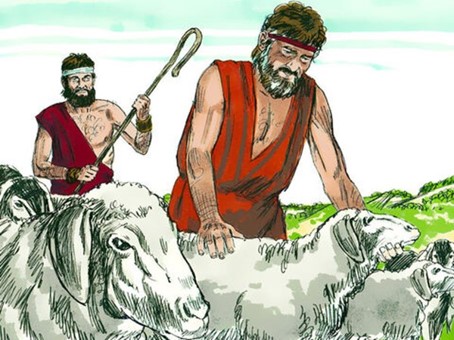
Not a long time later, Jacob became very wealthy, with large flocks of sheep and goats, female and male servants, and many camels and donkeys. It was so gradual that nobody noticed initially. But Laban’s sons had finally realized what had happened.
Laban’s sons were grumbling about him. “Jacob has robbed our father of everything!” they said. “He has gained all his wealth at our father’s expense.” Jacob began to notice a change in Laban’s attitude toward him.
For this time, Jacob’s plan worked really well. He outsmarted his uncle Laban. What a sweet revenge it was!
However, he did not know what would come next. De Ja Vu. The same thing had happened as it happened at his home. He got what he wanted by deceiving his father and brother, but he immediately got into a serious problem. Then he fled from home to avoid his brother Esau who tried to kill Jacob.
Jacob now realized he was trapped without a way to go out. He could not return to the home because Esau waited for Jacob to kill Jacob, and he could not stay at the Laban’s house because of what he did to Laban. Jacob made himself into this serious problem, and he had no place to escape. Jacob struggled and struggled that night, and suddenly he remembered God, who appeared to Jacob when he was desperate in the middle of the wilderness.
Yes, Jacob remembered God for this time. In reality, God made Jacob remember God. God let Jacob fall into his great problem. Jacob practically speaking stole his uncle’s flocks. But Jacob prayed.
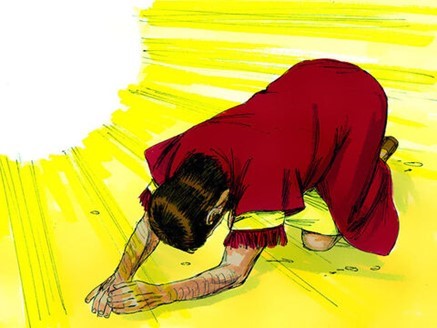
Sometimes, we suddenly remember God. In reality, it is not us but God who made us remember God. God uses a huge problem or a life storm. Thus, we have no place to go except God. If we still do not return to God, God will continue bringing life challenges to our lives. God, who dearly loves us, surely makes us remember God. Our God is our Ever-Loving Father, who truly wants us to come back to Him. If not, God keeps nudging us until we lift up our eyes to God to converse with God. What God wants is an intimate relationship with us. Thus, we’d better quickly and immediately go back to God with our authentic and contrite prayer.
God’s love is indeed deeply engraved in our lives. Please look back. When did we pray to God with our contrite hearts authentically without hiding anything? Wasn’t it when we were in serious trouble or a life storm? On the other hand, did we search for God when everything went well? No. We did not even remember God when everything goes well.
Jacob prayed with a contrite heart authentically by spreading out all his problems because he could solve none of them alone. God waited for this moment. Then God gave His answer to Jacob to lead him to the paths of righteousness. God’s answer always does not make sense. Often it is counter-intuitive. What was God’s answer to Jacob after he prayed to God?
“Return to the land of your father and grandfather and to your relatives there, and I will be with you.” (Genesis 31:3b)
God’s answer was to go back home. Didn’t God know Esau was waiting for Jacob to kill Jacob? Yes, God knew Esau was waiting for Jacob to kill. But God asked Jacob to return home.
If we were Jacob, which one do we choose? Getting killed by Esau by returning home or staying with Laban although we might have to pay back or return what we stole? Most of us would say it would be better to stay with Laban, although it would be disgraceful because it is better than getting killed.
After hearing God, Jacob struggled, but he obeyed God. He decided to go back home, although he knew it was essentially suicidal. God saw Jacob’s increased faith in God by trusting him more. God pleased and said again, “I will be with you.”
Jacob deceived and stole from Laban to pay back his pain. Then Jacob called Leah and Rachel and convinced them to leave Laban without telling him. Of course, Jacob did not explain what he had done to Laban. Instead, Jacob said the angel instructed him what to do, and he simply followed the angel’s instruction. Hmm. Jacob still had a long way to go. Indeed, yet, another lesson from God was waiting for Jacob, which we will see next week.
Again God let Jacob do whatever he liked to do, and God held Jacob tight no matter what Jacob did. God constantly nudged Jacob to guide him through the paths of righteousness.
Jacob put his wives and children on camels, and he drove all his livestock in front of him. He packed all the belongings he had acquired in Paddan-aram and set out for the land of Canaan, where his father, Isaac, lived, but his brother, Esau, was waiting for him to kill.
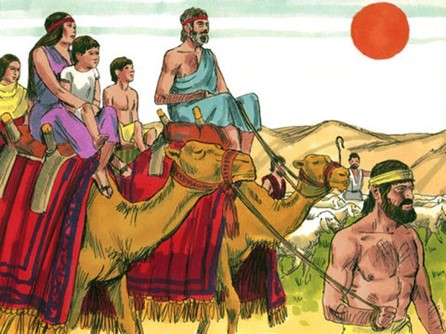
At the time they left, Laban was some distance away, shearing his sheep. Rachel stole her father’s household idols and took them with her. Rachel learned the bad behavior from Jacob. Those who are the head of the household should remember what Rachel did. All household members copy what the head of the household does.
Jacob outwitted Laban the Aramean, for they set out secretly and never told Laban they were leaving. Jacob took all his possessions with him and crossed the Euphrates River, heading for the hill country of Gilead.
Three days later, Laban was told that Jacob had fled. So he gathered a group of his relatives and set out in hot pursuit. He caught up with Jacob seven days later in the hill country of Gilead. But the previous night God had appeared to Laban the Aramean in a dream and told him, “I’m warning you—leave Jacob alone!”
Did God appear to Laban in his dream to warn Laban for Jacob because Jacob was completely upright before God? No. Jacob was still worldly, and he is a work-in-progress of God. Yes, Jacob indeed made huge progress by making his decision to follow God’s command despite his fear of Esau. However, Jacob did not stop deceiving his wives for his puny personal gain and satisfaction on earth. Despite the shortcoming of Jacob — worldly, deceptive, greedy, self-centered, and sinful, God loved Jacob and protected Jacob against Laban.
Why? Let’s ask this question — are there any parents who would not protect their children against the incoming danger to their children? No. All without exception will protect their children first. Laban was much stronger than Jacob, and Laban could easily wipe out Jacob. God sided Jacob like our earthly parents. But God’s love is beyond earthly parents’ love.
“Can a mother forget the baby at her breast and have no compassion on the child she has borne? Though she may forget, I will not forget you! (Isaiah 49:15)
Laban caught up with Jacob as he was camped in the hill country of Gilead, and he set up his camp not far from Jacob’s. “What do you mean by deceiving me like this?” Laban demanded. “How dare you drag my daughters away like prisoners of war? Why did you slip away secretly? Why did you deceive me? And why didn’t you say you wanted to leave? I would have given you a farewell feast, with singing and music, accompanied by tambourines and harps. Why didn’t you let me kiss my daughters and grandchildren and tell them good-bye? You have acted very foolishly! I could destroy you, but the God of your father appeared to me last night and warned me, ‘Leave Jacob alone!’ 30I can understand your feeling that you must go and your intense longing for your father’s home. But why have you stolen my gods?”
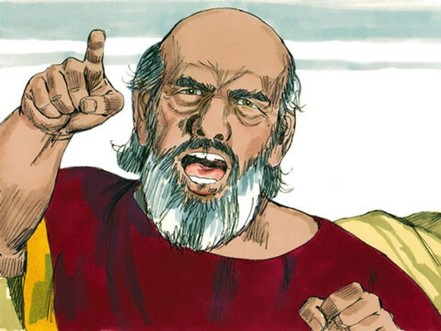
Yes, as Laban said, he could utterly destroy Jacob, but he couldn’t, not because he was generous and merciful, but because God personally showed up and warned Laban. Laban, thus, only came up with his one complaint — the stolen gods from his house.
“I rushed away because I was afraid,” Jacob answered. “I thought you would take your daughters from me by force.” Yes, Jacob was right, but God would not let it happen.
Jacob continued, “But as for your gods, see if you can find them, and let the person who has taken them die! And if you find anything else that belongs to you, identify it before all these relatives of ours, and I will give it back!” But Jacob did not know that Rachel had stolen the household idols. Too much being confident of anything on earth might not be wise because nobody knows all things. Who would think that Rachel would steal his father’s household idols?
Rachel learned the bad habit from Jacob. Rachel also had grown up under Laban, who treasured the household idols. Then for Rachel’s eyes, the household idols looked most precious. Children learn from their parents. If parents treasure earthly stuff, then their children will do the same. If parents treasure God, their children will treasure God.
Laban went first into Jacob’s tent to search there, then into Leah’s, and then the tents of the two servant wives—but he found nothing. Finally, he went into Rachel’s tent. But Rachel had taken the household idols and hidden them in her camel saddle, and now she was sitting on them. When Laban had thoroughly searched her tent without finding them, she said to her father, “Please, sir, forgive me if I don’t get up for you. I’m having my monthly period.” So Laban continued his search, but he could not find the household idols.
Then Jacob became very angry, and he challenged Laban. “What’s my crime?” he demanded. “What have I done wrong to make you chase after me as though I were a criminal? You have rummaged through everything I own. Now show me what you found that belongs to you! Set it out here in front of us, before our relatives, for all to see. Let them judge between us!”
Jacob had not reached the level that God wanted. Jacob became very angry. He forgot what he did, and he just blamed Laban. We know the reality. Rachel stole Laban’s household idols, and God saved Jacob. Jacob could have been gentle or even generous to Laban with a good word.
Pumped up by his own righteousness and knowing that he was at the higher ground, Jacob poured out, “For twenty years I have been with you, caring for your flocks. In all that time your sheep and goats never miscarried. In all those years I never used a single ram of yours for food. If any were attacked and killed by wild animals, I never showed you the carcass and asked you to reduce the count of your flock. No, I took the loss myself! You made me pay for every stolen animal, whether it was taken in broad daylight or in the dark of night.”
Jacob was slowly and steadily placing him on higher and higher ground by adding and exaggerating things that he did. Based on what he did so far, it is hard to believe the last part of what he said. Jacob would have had never taken any loss for Laban. If so, Jacob and Laban would have had not gone this far. Laban was not so much different from Jacob, either.
Now, here comes Jacob’s final argument that portraited him a truly innocent, patient, and God-fearing man, “I worked for you through the scorching heat of the day and through cold and sleepless nights. Yes, for twenty years I slaved in your house! I worked for fourteen years earning your two daughters, and then six more years for your flock. And you changed my wages ten times! In fact, if the God of my father had not been on my side—the God of Abraham and the fearsome God of Isaac—you would have sent me away empty-handed. But God has seen your abuse and my hard work. That is why he appeared to you last night and rebuked you!”
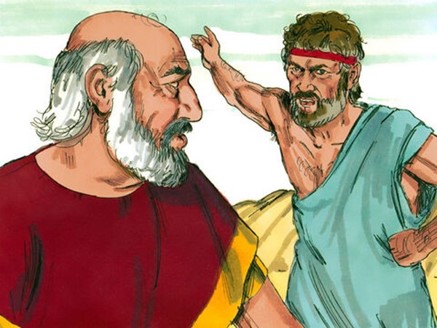
Jacob was getting to know about God, but he had never allowed God to be in his life as his master. Jacob, so far, used God. When he was weak, he played nicely. But when Jacob was strong, he was rude to others without showing any mercy as God did to him. Jacob quickly forgot what God did to him when he was in trouble. Jacob even used God to support his position.
God was different. When Jacob came to God, regardless what Jacob did, God welcomed Jacob and answered because God was love. God was Jacob’s Ever-Loving Father.
To Jacob, God was like a vending machine — putting a coin and getting a food item that he liked. Jacob only knew how to get something out of God without really having a deeper relationship with God.
Let’s stop criticizing Jacob. We can go on and on about Jacob. Instead, look back and see how much we are different from Jacob. Are we really different?
When did we go back to God with a contrite heart and pray to God authentically? Wasn’t it when we need God most? What we did to God when everything went well? Have we even remembered God while just enjoying our lives?
Shouldn’t we bring God to the center of our lives when everything goes well? After all, have we tried to bring God into our lives only after getting into a life storm?
By the way, our life storm, whether we like it or not, is God’s loving and purifying tool, which is always effective for those whom God loves and those who believe this truth. We will see more about Jacob next week how God further shaped Jacob till God created the true heir of God’s covenantal promise — to be the father of many nations and the source of blessings for all nations.
God, who loves us, shapes us with His unfailing love as God always loved Jacob unconditionally. God wants us to experience God and truly know Him. God desires us to be His true heirs who give the light to the world, darkening every moment. The world reciprocates pains to others as getting, but God forgives and gives back with love as Jesus forgave those who crucified, insulted, and mocked him on the cross. Then shouldn’t we?

And I am sure of this, that he who began a good work in you will bring it to completion at the day of Jesus Christ. (Philippians 1:6)
